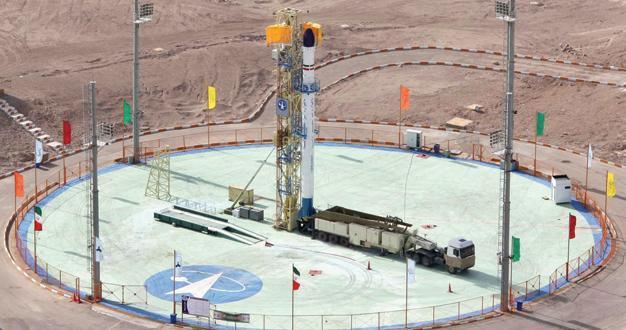UN agency presses Iran ahead of Baghdad talks
VIENNA

This file photo released on June 16, 2011, by the Iranian Defense Ministry, claims to show the Safir, satellite launching rocket, which will carry Iran’s Rasad satellite into earth orbit. AP photo
The U.N. nuclear agency pressed
Iran for greater cooperation yesterday in their first meeting since a “failed” visit in February, with world powers watching closely ahead of their Baghdad talks next week.
“It is important now that we can engage on the substance of these issues and that Iran let us have access to people, documents, information and sites,” International Atomic Energy Agency (IAEA) chief inspector Hermann Nackaerts said as he went into two days of talks with Iran’s envoy, Ali Asghar Soltanieh in Vienna.
In particular Nackaerts wants Iran to address claims made in an extensive IAEA report in November that at least until 2003, and possibly since, there were activities which could only conceivably be aimed at developing the bomb. He also wants access to the Parchin military base near Tehran where the IAEA report -- which cited foreign intelligence, its own sources and Iranian information -- said Iran had conducted explosives tests in a metal container.
In two visits to Tehran in January and February, branded a “failure” by Washington, the IAEA said Iran denied Nackaerts access to the site and dismissed out of hand the claims made in the report as based on forgeries. IAEA chief Yukiya Amano said recently that access to Parchin was a “priority” and said in March that “activities” spotted by satellite there “makes us believe that going there sooner is better than later.”
Iran, which disputed the IAEA’s version of events during the two visits, says that since no nuclear activities took place at Parchin, it is under no obligation to allow the IAEA in. It has said it would allow access to Parchin but only as part of a broader agreement on “modalities” for future cooperation, Agence France-Presse reported.
‘Positive atmosphere in Istanbul’
Since February, hopes have emerged that perhaps feeling the pressure from new US and EU sanctions due to bite from mid-2012, Iran’s approach has changed. Iran and the P5+1 - Britain, China, France, Russia and the United States plus Germany - held their first talks in 15 months in Istanbul in April, and agreed to more in-depth discussions in Baghdad on May 23. Iranian foreign ministry spokesman Ramin Mehmanparast yesterday reiterated that Tehran will “welcome” a Baghdad meeting which is not influenced by “pressure and preconditions,” the Fars news agency quoted him as saying. “If 5+1 intends to cooperate in a positive atmosphere in the talks, we will welcome such negotiations. Fortunately there was a positive atmosphere in Istanbul which formed a basis for talks founded on Non-Proliferation Treaty (NPT).
This is a good framework,” Mehmanparast said. “According to NPT we have some obligations and some rights that we should enjoy. But we have to wait until Baghdad talks for the details of the agreement,” he added. The Iranian media reported late May 13 that Iran’s top negotiator Saeed Jalilii had said that “any kind of wrong calculations by the West will not yield success in the talks. In Baghdad we are awaiting actions to secure the Iranian people’s trust.”
UN, nuke talks,
